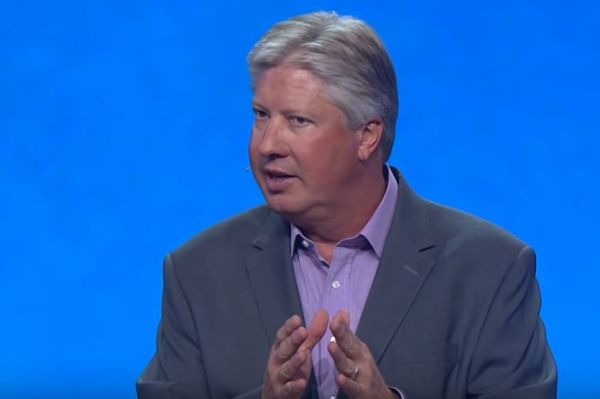In Evangelical thought, is Jordan Peterson a Worldly Wiseman?

Last week in London, over 12,000 people attended The O2 and paid “significant sums of money to watch (Jordan) Peterson, the rockstar of public intellectuals” and other panelists to discuss “everything from marriage ... to what the book of Job tells us about suffering.” Peterson began by asking the audience, “What are we all doing here?” Spectators may have had diverse responses, but the greater question was really: What are we searching for and expecting to find?
Angst is everywhere and people are searching for what can reconcile one’s fragile existence with a threatening world of uncertainty. The Gospel has always offered Christ who “has broken down in his flesh the dividing wall of hostility ... that he might create in himself one new man ... so making peace” (Eph. 2:14-15). I think that the challenge for contemporary Christian faith is that the Gospel offers non-tangibles, and so the tangible competes ferociously.
Modern people are conditioned to be educated by observed phenomena. Thus humanity’s innate sensitivity for God is now distracted by the allure of teachings on self-improvement. This is nothing new, as every epoch has known. Like Bunyan’s timeless Worldly Wiseman whose counsel sought to replace Evangelist’s message of faith:
“Why in yonder village ... there dwells a gentleman, whose name is Legality, a very judicious man ... that has skill to help men off with such Burdens as thine is, from their shoulders; yea, to my knowledge, he hath done a great deal of good this way: Ay, and besides, he hath skill to cure those that are somewhat crazed in their wits with their Burdens. To him, as I said, thou may’st go, and be help’d presently.”[1]
Today’s Worldly Wiseman attempts to naturalize spiritual sensitivities in a manner that is culturally palatable. This attempt is noteworthy in Peterson. He is urbane, intellectual, a clinical psychologist, and offers many insights on biblical themes. With 7.5 million YouTube subscribers and over 600 million views, he is a bona fide influencer who is establishing a subculture of searching followers. What is particularly noble about Peterson is his honesty to often say “I don’t know” or “I don’t understand.” Such sincere concessions make him a decently humble and likeable person.
When it comes to the Gospel, however, his naturalized explanations present a “Christ” who offers an “unshakable moral proposition” and the resurrection as a “metaphor” where “parts of us must die because they are in error and then we move forward and are constantly re-born as a consequent of going forward.”[2] Peterson’s “Christ” symbolizes an exceptional ideal that merits emulative action. Peterson takes great liberty to read his own ideas into the Gospel. It’s quite bold, actually. People listen because they believe he is culturally more exciting than the stereotypical banality of a preacher’s sermon.
On Christ’s teachings, Peterson also sermonized:
“These stories portray the existential dilemma that eternally characterizes human life: it is necessary to conform, to be disciplined, and to follow the rules — to do humbly what others do, but it is also necessary to use judgment, vision, and the truth that guides conscience to tell what is right, when the rules suggest otherwise. It is the ability to manage this combination that truly characterizes the full developed personality: the true hero.” [3]
This abstract idea of “Christ” offers a narrative that doesn’t really require faith; it requires adherence to principles that provide improvement for those who can appreciate them. This is a form of legalism. That is, one must fulfill a moral code as exemplified by principles in the life of “Christ” in order to ameliorate oneself. As well, the sensitivity to conscience seems enough to gauge an identity with “Christ.” Peterson’s ideas of “Christ” are complex, but alluring as one can get a feeling of spirituality without obeying Christ to “Repent, for the Kingdom of Heaven is at hand” (Matt. 3:2).
What Peterson doesn’t seem to get is that whether you call it “chaos” or rebellion, or any other moniker that describes moral shortcomings, it’s essentially a repackaging of sin. Yet his “Christ” is culturally more appealing than the Gospel’s invitation to repentance, to justification by faith, and to new life in Christ. That’s because Peterson deals with tangibles that are easily adoptable, whereas the Gospel offers intangibles with heartfelt accountability.
As a psychologist, his tips for emotional well-being do offer practical wisdom and educated advice. The weaving of biblical themes into his brand of self-improvement is merely another opinion in the long history of attempts at naturalizing Christian thought. Such opinions have always found a hearing in culture because inward selfishness is not directed at repentance but towards a negotiation of sin.
I have a ton of respect for Peterson’s public intellectualism, but he lacks the import of what is central to the Gospel: “God shows his love for us in that while we were still sinners, Christ died for us” (Rom. 5:8). My counsel to people who wish to pay “significant sums of money” to listen to Peterson is go ahead if you wish to glean psychological insights, critiques of cultural thought, and to consider his tips on various topics. If you are searching for forgiveness, new life, and ultimate fulfillment, then bypass Peterson’s filters on Christian faith and explore the Gospel for yourself. Don’t believe that in a post-modern culture, only sophisticated cultural icons can offer exciting reflections on spiritual matters.
Be mindful that what prevents most seekers from wholehearted searching is fear of discovering what will eradicate inherent selfishness. “Let not your heart be troubled,” said Jesus (John 14:1). Your personal acceptance of Christ will lead you to experience real “order” out of “chaos.” You will realize deep within what Jesus promised: “the truth will set you free” (John 8:32).
Intellectual respect and assent to a naturalized “Christ” is far different from personally knowing Him. As Bunyan’s Christian said:
“How! Think thou must believe in Christ, when thou seest not thy need of him! Thou neither seest thy original nor actual Infirmities, but hast such an opinion of thyself, and of what thou dost, as plainly renders thee to be one that did never see a necessity of Christ’s personal Righteousness to justify thee before God. How then dost thou say, I believe in Christ?” [4]
1. John Bunyan, The Pilgrim’s Progress (Westwood, New Jersey: Barbour and Company, n.d.), 13-14.
2. Jordan B. Peterson, Christianity and the Modern World, YouTube 1:15:15 to 1:17
3. Jordan B. Peterson, Beyond Order: 12 More Rules for Life (Toronto, ON: Random House Canada, 2021), 47.
4. The Pilgrim’s Progress, 169.
Marlon De Blasio is a cultural apologist, Christian writer and author of Discerning Culture. He lives in Toronto with his family. Follow him at MarlonDeBlasio@Twitter





















